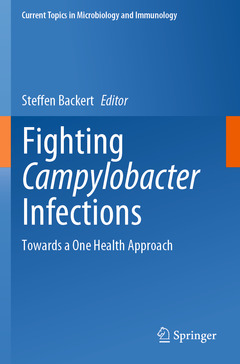Description
Fighting Campylobacter Infections, 1st ed. 2021
Towards a One Health Approach
Current Topics in Microbiology and Immunology Series, Vol. 431
Coordinator: Backert Steffen
Language: English
Subjects for Fighting Campylobacter Infections:
Publication date: 02-2022
319 p. · 15.5x23.5 cm · Paperback
Publication date: 02-2021
319 p. · 15.5x23.5 cm · Hardback
Description
/li>Contents
/li>Biography
/li>Comment
/li>
This edited volume explores Campylobacter species, which are some of the most important foodborne pathogens. Above all, contaminated poultry meat can cause human gastroenteritis in both developed and developing countries. The respective contributions reveal how these infections can also increase the risk of generalized paralytic diseases such as Guillain-Barré syndrome, Miller-Fisher syndrome, and Chinese paralytic syndrome. Due to their influence on the nervous system, circulatory system, and various organs, Campylobacter infections represent a serious public health concern.
Campylobacter can be effectively combated by addressing the hygienic conditions in both food production and human lifestyles. Accordingly, the authors put forward a One Health perspective, which provides readers with essential insights into the basic biology of Campylobacter, as well as practical guidance on aspects ranging from food production tothe clinical treatment of infections.
Chapters 'Population Biology and Comparative Genomics of Campylobacter Species' and 'Natural Competence and Horizontal Gene Transfer in Campylobacter' are available open access under a Creative Commons Attribution 4.0 International License via link.springer.com.
Human campylobacteriosis - a serious infectious threat in a One Health perspective.- The data behind risk analysis of Campylobacter jejuni and Campylobacter coli infections.- Population biology and comparative genomics of Campylobacter species.- Management strategies for prevention of Campylobacter infections through the poultry food chain: a European perspective.- Emission sources of Campylobacter from agricultural farms, impact on environmental contamination and intervention strategies.- Phage biocontrol of Campylobacter: a One Health approach.- Campylobacter virulence factors and molecular host-pathogen interactions.- Diarrheal mechanisms and the role of intestinal barrier dysfunction in Campylobacter infections.- Murine models for the investigation of colonization resistance and innate immune responses in Campylobacter jejuni infections.- Natural competence and horizontal gene transfer in Campylobacter.- Molecular mechanisms of Campylobacter biofilm formation and quorum sensing.
Steffen Backert is the full Professor of Microbiology in the Department of Biology at Friedrich Alexander University Erlangen-Nuremberg, Germany. His group is working in the field of Microbial Pathogenesis for about 25 years, investigating molecular signalling pathways during host-pathogen interactions in enteric infections such as that of Campylobacter jejuni and Helicobacter pylori. His research interest focuses on the identification and characterization of new bacterial virulence factors (secreted or injected), which could represent potential novel targets for therapeutic intervention. He has authored more than 220 peer-reviewed publications and edited eight scientific books. He is Associate Editor of various highly ranked research journals and has a strong and consistent record of gaining competitive research funding. Professor Backert is inventor on five patents.




